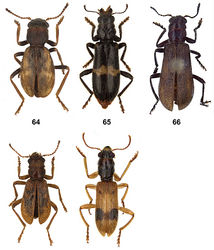Orthrius
| Notice: | This page is derived from the original publication listed below, whose author(s) should always be credited. Further contributors may edit and improve the content of this page and, consequently, need to be credited as well (see page history). Any assessment of factual correctness requires a careful review of the original article as well as of subsequent contributions.
If you are uncertain whether your planned contribution is correct or not, we suggest that you use the associated discussion page instead of editing the page directly. This page should be cited as follows (rationale):
Citation formats to copy and paste
BibTeX: @article{Roland2011ZooKeys92, RIS/ Endnote: TY - JOUR Wikipedia/ Citizendium: <ref name="Roland2011ZooKeys92">{{Citation See also the citation download page at the journal. |
Ordo: Coleoptera
Familia: Cleridae
Name
Orthrius Gorham, 1876 – Wikispecies link – ZooBank link – Pensoft Profile
Type species:
Orthrius cylindricus Gorham, 1876. Gorham 1876[3]: 74.
Distribution:
Indo-Australian region.
Material examined:
Orthrius cylindricus (Type), NSW; Orthrius Gorh., cylindricus G., Type; Museum Paris, Coll. Gorham, 1914 (MNHN); and several other specimens of this genus. Dedana rufodorsata Fairmaire, 1888 (Type), Fokien; Dedana rufodorsata Fairm.; ExMusaeo Arm. David, 1900 (MNHN).
Description
Head: Eyes strongly protruding, only slightly emarginate at antennal insertion; interocular space more than one eye width; gular sutures converging, gular process broad; antennae long, A2 shorter than A3, A2-A8 filiform, A10 broadest, A11 sub-ovate, apical half pinched, terminal three antennomeres forming a more or less conspicuous club.
Thorax: Proepimeron short to medium-sized, not acute; anterior mesosternal process absent; metendosternite with normal furcal stalk length, furcal arms normal, stalk base very slightly emarginate (Fig. 18). Elytra long, subparallel, sometimes dilated apically (broadest behind middle), apices rounded, elytral punctation not arranged into striae.
Legs: Long, especially profemora intermediately to strongly thickened; tarsal pulvillar formula 4-4-3, tibial spur formula 0-1-1; tibiae with longitudinal carinae; claws simple.
Abdomen: Apical margin of male ventrite 6 straight or slightly emarginate (Fig. 54); tegmen relatively broad, parameres expanded laterally, tapering to a curved acumination distally, phallobasic struts not fused, phallobasic apodeme dilated distally (Fig. 44).
Taxon Treatment
- Roland, G; Jonas, E; 2011: Definition and Revision of the Orthrius-group of genera (Coleoptera, Cleridae, Clerinae) ZooKeys, 92: 35-60. doi
Other References
- ↑ Fairmaire L (1888) Coléoptères de l’intérieur de la Chine. Annales de la Société entomologiques Belgiques 32:7-76.
- ↑ Schenkling S (1903) Coleoptera. Malacodermata. Fam. Cleridae. In: Wytsman P (Ed) Genera Insectorum, Fasc. 13, P. Wytsman, Bruxelles, 124pp.
- ↑ Gorham H (1876) Notes on the coleopterous family Cleridae, with descriptions of new genera and species. Cistula Entomologica 2:57-106.






